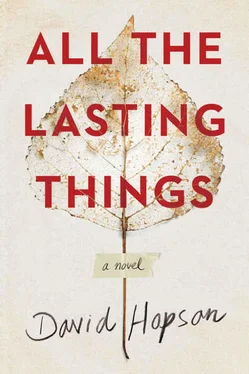“It has fountains. And weeping willows. It’s lovely.”
“So displacing the dead from their eternal resting ground really makes you a humanist.”
“But then come the historical societies,” said Nick, ignoring the jab. “Saratoga. Bemis Heights. Even Alluvia has one. They’re all over this part of the state, protecting every last log George Washington ever peed on. ‘There are soldiers buried there!’” His imitations were, as she remembered them, passionate but limited: everyone sounded like Jerry Lewis with a cold. “‘This is hollow ground.’ One of them actually said that to me. ‘Hollow ground.’ Maybe it was Benji’s girlfriend. Is she dumb?”
“I don’t think so.”
“These people,” he mused venomously. “The women would be happy churning their own butter while the men spend their weekends reenacting the Battle of Freeman’s Farm. It’s all spinsters and Second Amendment wackadoos.”
“A humanist and a patriot,” Claudia said, her hand finding its way to the console between them, her fingers, as if drawn by a magnet, tantalizingly close to his leg.
And Max, on the porch.
“Why do you care? If it’s your property? It is your property, right?”
“It’s mine. But contrary to popular belief, not all publicity is good publicity. The average resident of your high-end housing community wants to live outside the shadow of death and desecration.” He changed tack and said, wounded, “You know what those T-shirts say? ‘Amato & Sons Need to Develop… a Conscience.’” He shifted the Escalade into park and turned to face her. “I have a conscience.”
“I know you do, but … ”
“But. What? I don’t have a conscience?”
“Not that. I was going to say the kind of developments you’re talking about? If you think about it? They’re the opposite of communities, Nick. People living like that wave to the neighbors across their half acre of lawn, and that’s it. There’s no interaction. Maybe a Halloween block party, but no public life to speak of. People are more likely to get in the car and drive to buy sugar than borrow a cup from the neighbor next door.”
“Who still borrows sugar? You sound like you might like to churn some butter yourself.”
“Are you calling me a spinster?”
He stared down at the rings on her left hand.
They turned to look out the window at the view afforded by the noonday sun: the clustered cemetery with headstones like broken teeth, the distant trees, a stretch of purplish mountain painted across the horizon.
“It’s beautiful,” said Claudia, “in a tumbledown sort of way.”
He gave a quick, devilish smile and asked, “So what would you do, Madam Architect? You’ve got a hundred acres. No cemetery. No redcoats.”
“No budget?”
“Let’s not get crazy.”
“You don’t want cute little houses. What do you want?”
Nick bowed to her, as if ceding the floor. His eyelashes were as long and lovely as she remembered them.
“I’d build apartments.”
“Apartments.”
“Or row houses. Compact, sustainable residences surrounding a public lawn or garden. Pedestrian-friendly sidewalks. A community center. You know, a playground, a pool. Maybe some retail space. I know it’s a sacrilege in these parts, but something to encourage people to get out and walk.”
“Nobody likes to walk,” Nick said with a philosophic shake of his head. “And nobody likes to rent.”
“I rent.”
“You live in the city. Up here, nobody lives in apartments.”
Her face crumpled in amused disbelief.
“The poor and the elderly, okay. But no one else.”
“And we wouldn’t want them on our hands, would we?”
“People think it’s a punishment to live in an apartment. They want the American dream. With a nice big lawn for their neighbors to keep off of.”
They were twenty-two years old. How could he have expected more from her, at twenty-two?
“This is Alluvia,” Claudia said with fresh focus. “You can’t drive ten miles in any direction without hitting a trailer park or a meth lab. You talk about high end, but it’s not exactly the Hamptons set.”
“You’re still a snob.” Then: “The demographic is changing.”
“Well then, so can what the demographic wants.” Claudia willed a shift into lecture mode, tucked a strand of stray hair behind her ear, and began. “Nakagin Capsule Tower. Ever heard of it? It’s one of the first buildings I ask my students to study. Not because it’s flawless architecture. It’s not. The apartments are straight-up Stanley Kubrick. Lacquered white walls, built-in reel-to-reels. Very Tokyo. Very 2001: A Space Odyssey . But it’s significant. It was built in the early seventies to house Japanese salarymen. Google it. You’ll see, it points to a completely different concept of living. A completely different set of values. It says you can cook, sleep, eat, shower, even bop along to your reel-to-reel, and you don’t need more than one hundred square feet to do it. You can live life in a — I called it an apartment, but really it’s a pod, a, well, a capsule, an eight-by-twelve—”
“Eight by twelve.” Nick exploded with a guttural laugh.
“See? It’s unimaginable to us.”
“It’s not unimaginable. People do it all the time. In Attica. In Sing Sing.”
“It was an experiment. A failed experiment,” Claudia confessed. “But the idea is compelling.”
“Among Japanese businessmen, maybe. You’re insane, Claude.”
“I’m not talking about building actual pods.”
“Americans,” Nick continued as if he hadn’t heard her, “don’t like identical. I don’t want my pod to look like your pod. I know what you’re going to say: then why do they live in cookie cutter subdivisions. True. But they like the illusion—”
“The myth.”
“The myth.” Nick nodded. “My house is different from yours. My house, my couch, my car — even if they’re exactly the same — are better than yours. It’s why we have ninety-five brands of toilet paper. I’m Charmin. You’re Cottonelle. It’s what makes me me.”
“Ah, the Individual! Let Lady Gaga decide she wants to live in a pod, and you’ll see how many people really want to be an individual. You wouldn’t be able to make them fast enough.”
“So you want me to build the Nagako?”
“Nakagin Capsule Tower.”
“In Alluvia, New York?”
“No. But architecture that questions our use of space is possible. What are we leaving behind? Is it propitious or poisonous? We have the right — the duty, actually — to ask those things. Even here. Even in Alluvia.”
The two of them, facing each other, struck a pose of serious consideration, both sober and unsmiling, until their eyes met and laughter, like water topping a levee, burst forth.
“Propitious,” Nick said as soon as he’d caught his breath. “Propitious!”
“What’s the matter with propitious?”
“All I’ll say is people around here don’t want their houses asking them questions.”
She felt his hand before she saw it move. The heavy warmth of it on her cheek startled her, and before she could stop herself, she pulled away. Stung, Nick no sooner opened his mouth to apologize than Claudia, straining against her seat belt, leapt forward. She clasped his face, the satisfyingly rough plains of silver-flecked stubble, and pulled him into a crude but fervent kiss. Nick fumbled to free himself from his own seat belt without letting his lips leave hers. Loose, he shocked her again by squeezing improbably through the narrow space between the front seats, pawing, like a swimmer reaching for shore, toward the space he called the “way back.” Tumbling over the backseat with a theatrical groan, he hurriedly lowered the seat backs, twice hitting his head, and crawled toward Claudia across the now flat expanse of coarse black carpet. Again, drawn like a magnet, she shot through the same soft leather chasm, pulling Nick with her as she inched her way toward the tailgate, flat on her back, staring into his eyes as he positioned himself over her, helping his fingers move from one button to the next.
Читать дальше












